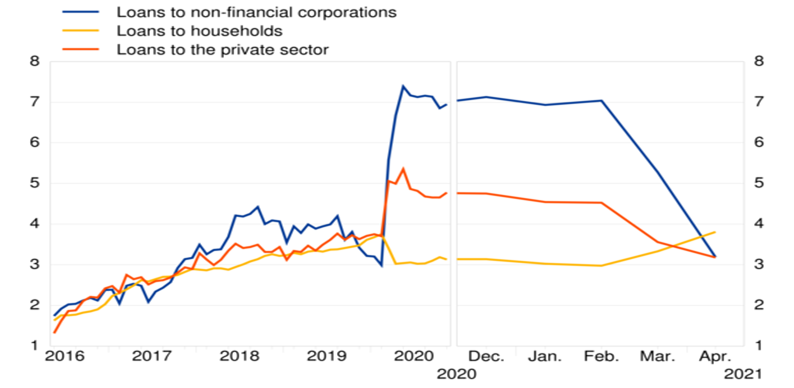- PRESS RELEASE
Monetary developments in the euro area: April 2021
31 May 2021
- Annual growth rate of broad monetary aggregate M3 decreased to 9.2% in April 2021 from 10.0% in March (revised from 10.1%)
- Annual growth rate of narrower monetary aggregate M1, comprising currency in circulation and overnight deposits, decreased to 12.3% in April from 13.6% in March
- Annual growth rate of adjusted loans to households increased to 3.8% in April from 3.3% in March
- Annual growth rate of adjusted loans to non-financial corporations decreased to 3.2% in April from 5.3% in March
Components of the broad monetary aggregate M3
The annual growth rate of the broad monetary aggregate M3 decreased to 9.2% in April 2021 from 10.0% in March, averaging 10.5% in the three months up to April. The components of M3 showed the following developments. The annual growth rate of the narrower aggregate M1, which comprises currency in circulation and overnight deposits, decreased to 12.3% in April from 13.6% in March. The annual growth rate of short-term deposits other than overnight deposits (M2-M1) decreased to 0.3% in April from 0.9% in March. The annual growth rate of marketable instruments (M3-M2) increased to 10.6% in April from 7.0% in March.
Chart 1
Monetary aggregates
(annual growth rates)

Looking at the components' contributions to the annual growth rate of M3, the narrower aggregate M1 contributed 8.6 percentage points (down from 9.4 percentage points in March), short-term deposits other than overnight deposits (M2-M1) contributed 0.1 percentage point (down from 0.2 percentage point) and marketable instruments (M3-M2) contributed 0.5 percentage point (up from 0.4 percentage point).
From the perspective of the holding sectors of deposits in M3, the annual growth rate of deposits placed by households decreased to 8.3% in April from 9.2% in March, while the annual growth rate of deposits placed by non-financial corporations decreased to 12.8% in April from 18.0% in March. Finally, the annual growth rate of deposits placed by non-monetary financial corporations (excluding insurance corporations and pension funds) increased to 8.7% in April from 4.0% in March.
Counterparts of the broad monetary aggregate M3
As a reflection of changes in the items on the monetary financial institution (MFI) consolidated balance sheet other than M3 (counterparts of M3), the annual growth rate of M3 in April 2021 can be broken down as follows: credit to general government contributed 6.8 percentage points (down from 7.9 percentage points in March), credit to the private sector contributed 4.1 percentage points (down from 4.8 percentage points), longer-term financial liabilities contributed 0.1 percentage point (as in the previous month), net external assets contributed -0.1 percentage point (up from -0.8 percentage point), and the remaining counterparts of M3 contributed -1.7 percentage points (up from -2.0 percentage points).
Chart 2
Contribution of the M3 counterparts to the annual growth rate of M3
(percentage points)

Credit to euro area residents
As regards the dynamics of credit, the annual growth rate of total credit to euro area residents decreased to 7.7% in April 2021 from 9.1% in the previous month. The annual growth rate of credit to general government decreased to 18.0% in April from 21.9% in March, while the annual growth rate of credit to the private sector decreased to 4.0% in April from 4.6% in March.
The annual growth rate of adjusted loans to the private sector (i.e. adjusted for loan sales, securitisation and notional cash pooling) decreased to 3.2% in April from 3.6% in March. Among the borrowing sectors, the annual growth rate of adjusted loans to households increased to 3.8% in April from 3.3% in March, while the annual growth rate of adjusted loans to non-financial corporations decreased to 3.2% in April from 5.3% in March.
Chart 3
Adjusted loans to the private sector
(annual growth rates)

Notes:
- Data in this press release are adjusted for seasonal and end-of-month calendar effects, unless stated otherwise.
- "Private sector" refers to euro area non-MFIs excluding general government.
- Hyperlinks in the main body of the press release and in annex tables lead to data that may change with subsequent releases as a result of revisions. Figures shown in annex tables are a snapshot of the data as at the time of the current release.
Banque centrale européenne
Direction générale Communication
- Sonnemannstrasse 20
- 60314 Frankfurt am Main, Allemagne
- +49 69 1344 7455
- media@ecb.europa.eu
Reproduction autorisée en citant la source
Contacts médias-
31 May 2021


